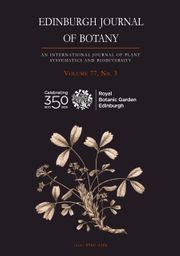Article contents
RECIRCUMSCRIPTION AND NEW SYNONYMS OF BEGONIA ACERIFOLIA (BEGONIACEAE) AND AMENDED DESCRIPTIONS OF THE POORLY KNOWN B. HYDROPHYLLOIDES AND B. VELATA
Published online by Cambridge University Press: 10 April 2017
Abstract
A taxonomic study was conducted of four Andean Begonia species, each originally described only from its type collection: Begonia hydrophylloides L.B.Sm. & B.G.Schub., B. triramosa Irmsch., B. velata L.B.Sm. & B.G.Schub. and B. xerophyta L.B.Sm. & Wassh. Amended descriptions of Begonia hydrophylloides and B. velata are provided. The distribution range of Begonia hydrophylloides is extended to include the Colombian department of Meta, as well as Cundinamarca. Begonia velata, originally described from Huncabamba Province, of Píura Region, Peru, has its distribution range extended to include Contumazá Province, of Cajamarca Region, Peru. Begonia triramosa, described from Chimborazo Province, Ecuador, and B. xerophyta, described from Loja Province, Ecuador, are both synonymised with B. acerifolia Kunth. Following an in-depth taxonomic study of Begonia acerifolia, an additional species, B. erythrocarpa A.DC., is synonymised with this species. An amended description of Begonia acerifolia is provided, and the species is recorded from Andean Ecuador, Peru and Bolivia. Begonia hydrophylloides, B. velata and B. acerifolia are all affiliated with species currently classified in the polyphyletic Begonia sect. Knesebeckia (Klotzsch) A.DC. Begonia hydrophylloides is assessed as Data Deficient (DD), B. velata is assessed as Vulnerable (VU) and B. acerifolia is assessed as Least Concern (LC), according to IUCN criteria.
Keywords
- Type
- Articles
- Information
- Copyright
- Copyright © Trustees of the Royal Botanic Garden Edinburgh (2017)
References
- 1
- Cited by


